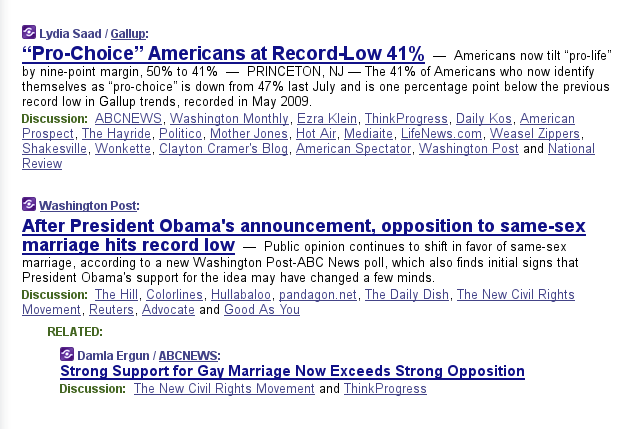I’ll admit it. I have an axe to grind with search engines, and there’s a rant coming about them Real Soon Now. But the following just cries out for immediate carping. Via Groklaw – Digging for Truth, Volokh and Falk (pdf) on the topic of free speech protections for search engines:
…search engines are speakers. First, they sometimes convey information that the search engine company has itself prepared or compiled …. Second, they direct users to material created by others, …. Such reporting about others’ speech is itself constitutionally protected speech.
Third, and most valuably, search engines select and sort the results in a way that is aimed at giving users what the search engine companies see as the most helpful and useful information.
My beef isn’t (at least not here) about whether or not a private company making money through speech has the same protections as an individual expressing a political opinion. I want to draw attention to the framing. “[S]earch engines select and sort the results in a way that [aims to give] users what the search engine companies see as the most helpful and useful information.”
That’s what the search engines say they do. That is accepting their version of their actions without question.
The most elementary detective principles suggest it’s dumb not to at least ask, “Who benefits?” Pretending it’s a given that the user benefits is either foolish, lazy, or propaganda, or all three.
Search engines are private companies. Their first loyalty is to their own profit. They have to put effort into service to the users; it’s a cost. If other businesses are anything to go by, it will be minimized to the extent compatible with retaining enough users to make a profit. The profits come from ads. The first priority of search engines will be getting clicks on ads.
There. That’s not even difficult or tedious to figure out. It’s about three steps in all.
More important, it’s vitally relevant to how many free speech rights must be granted to search engines. If they’re in this to push the boundaries of human knowledge, why, then, give them every right there is. That would mean the least regulation for the search companies, which would suit them just fine. If they’re in this to push ads, then maybe we shouldn’t be quite so laissez-faire about allowing them to rank results however they please. They’d make less money. Is it any wonder they’re so publicly convinced they have only the interests of the users at heart? Is it stranger that very intelligent people swallow the bait, hook, line, and sinker, and then create erudite reasoning about constitutional law out of it?
Sorry, folks. GIGO.
 Print This Post
Print This Post
 Print This Post
Print This Post



